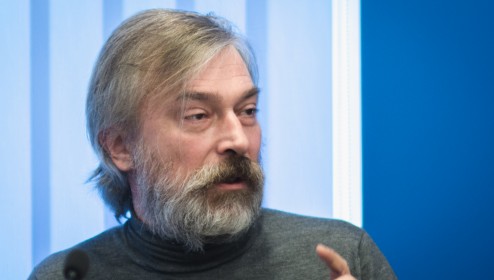
The main enemy of TV and film industry development is the indolence of top managers who are afraid to make out-of-the-box decisions, don’t want to risk and don’t like experimenting, believes Sergey Sozanovsky, co-founder of FILM.UA Group. “And we like experimenting,” he adds. Besides, he loves building and developing systems and his legal degree is of help here.
As of today, FILM.UA Group is considered the biggest company in the Eastern Europe in film and TV production. It includes more than 20 companies with clear specialization: production of full-length feature films, TV series and animation; realization of company rights on territories and media platforms; and creation of TV programs and adaptation of foreign content for the Ukrainian market. Besides, it has its own film studio with seven pavilions and companies offering post-production services: VFX and СGI, working with images, sounds and 3D graphics. And everything started 14 years ago, from a small production company.
Sergey, recently we were looking for people who’d participate in the jury panel for “Filmed in Ukraine” ranking – those who watch Ukrainian films and series, not cinematographers but still opinion leaders. The traditional answer was, “I don’t watch Ukrainian films.” And in best cases this statement was followed by an explanation, “Unfortunately, I do not have time.” But not infrequently the respondents added, “They are not interesting.” And those weren’t grassroots spectators; they were more or less known. Why am I telling all this: in your opinion, when will Ukrainians start watching their films and supporting Ukrainian production companies, actors, DOPs and directors with their own funds?
There is a certain widespread conviction that cinema is not a business. No doubt, this also pertains to film industry. If we talk about grassroots audience, they actually don’t care. They will just go for entertainment.
Due to a range of circumstances, we have an opinion that national cinema is something very sad and depressing – everyone dies in the end… The audience will not go to watch a national film until it is actually interesting and commercially successful, until the story captivates them. Until professional stakeholders of film industry – i.e., investors and the state – believe that it is possible, the audience won’t go to cinemas. But all these things are related. It is a vicious circle we have to break.
Recently I read reviews of cinema top hits in Europe during the last weekend of the previous year. In each country, the second or the third position is occupied by a national film: it is so in Turkey, Italy, Spain, Poland, Germany, and France. Star Wars ranks first, but it is a special happening; mostly the audience goes to see a national film.
Special Love for Star Wars
What about these film stories captivating and mesmerizing Ukrainians, should they be uniquely national? Or we needn’t reinvent the wheel and instead should carefully study successful schemes the world uses to operate?
There are different films. The Oscar triumph of the previous year, Birdman, is totally different from Star Wars.
And for most film experts its victory turned out to be unexpected…
This film is not for everyone. Still, it is commercially successful. Star Wars is a different story altogether. It is a film for the audience, precisely calculated business, very professional, though we can argue about the plot and acting ad nauseam. For example, these are the three distribution leaders of the previous year: Jurassic Park, Fast and Furious 7, and Star Wars.
I have special love for Star Wars. I am a crazy fan: we watch it with my 8-year-old daughter and 28-year-old son.
Disney might be rather harsh, but they are doing a good job, and they are very apt at making correct commercial steps. Now they look down on people who were saying, you are crazy if you buy Lucas’ rights for the Star Wars sequel and the whole universe of the saga. It was a blitzkrieg, and they won. And they’ll keep winning for a long time. Naturally, the following sequels will hardly enjoy the same commercial success, if they don’t come up with a miracle. But in any case they’ll be good.
What have they started doing in films now that you couldn’t imagine even five years ago?
A great trend for me – and I believe it’s going to continue – is when contemporary films based on franchises and sagas engage the same actors who were in them 30 to 40 years ago. Actually, it’s a fantastic story when we meet a character who became an adult. I like him; my daughter and son like him as well, and that’s a real fairy tale.
Successes of Competitors Don’t Let Us Be the ‘King of the Hill’
They call FILM.UA “Hollywood on the edge of Kyiv”; you are the biggest film production company in the Eastern Europe. Who do you consider your competitors?
A competitor is anyone creating a wonderful story. You don’t need fantastic capacities, technical knowledge or profound experience to do that. The story may simply become a hit and completely change the rules of the game on the market.
Naturally, unlike the media market or the market of television groups, we are in both competitor and partner relations with some players. There is Star Media, which mostly specializes in series production. Despite the fact that they are our competitors, we rent out our filming pavilions to them. It’s not because we love each other; it is just profitable – thanks to this cooperation, both us and them reduced expenses.
There is ProTV. Media groups make their first attempts to create production companies and make TV films on their own. There is Kvartal 95, which is a group of very talented guys. I believe that presently they rank first in Ukraine for distributed films. They have proven it.
Are you going to make joint film projects with Kvartal 95, for example?
The existence and successes of competitors make us work a bit faster. They don’t let us be “the king of the hill”; they make us think, move and make decisions. And ultimately – unite. Again, the reality of the market makes it rather hard for everyone to survive on their own. By joining efforts, you can obtain the biggest possible result, which will satisfy all players. And one can’t say that someone plays the first fiddle, and someone is of secondary importance in this union.
I hope that such union will bring advantages to us, the audience, as well – I mean new quality. The union of players at TV and film market is definitely a trend of the previous year. #KinoKraina initiative, which you also became a part of, is a totally unique case for film industry…
Actually, apart from the story which can be briefly described as “fallen market, reduced advertising budgets, loss of the portion of cinema market – Crimean cinemas gone and cinemas not functioning on eastern territories”, the players united to establish reasonable rules of the game. This will allow to transform our market, which is now at the very start of its journey, into a normal and predictable one, into the market built according to European standards. Then what I was talking about will happen: national films will collect huge box offices in national distribution and on adjacent territories. In this world, everything is connected.
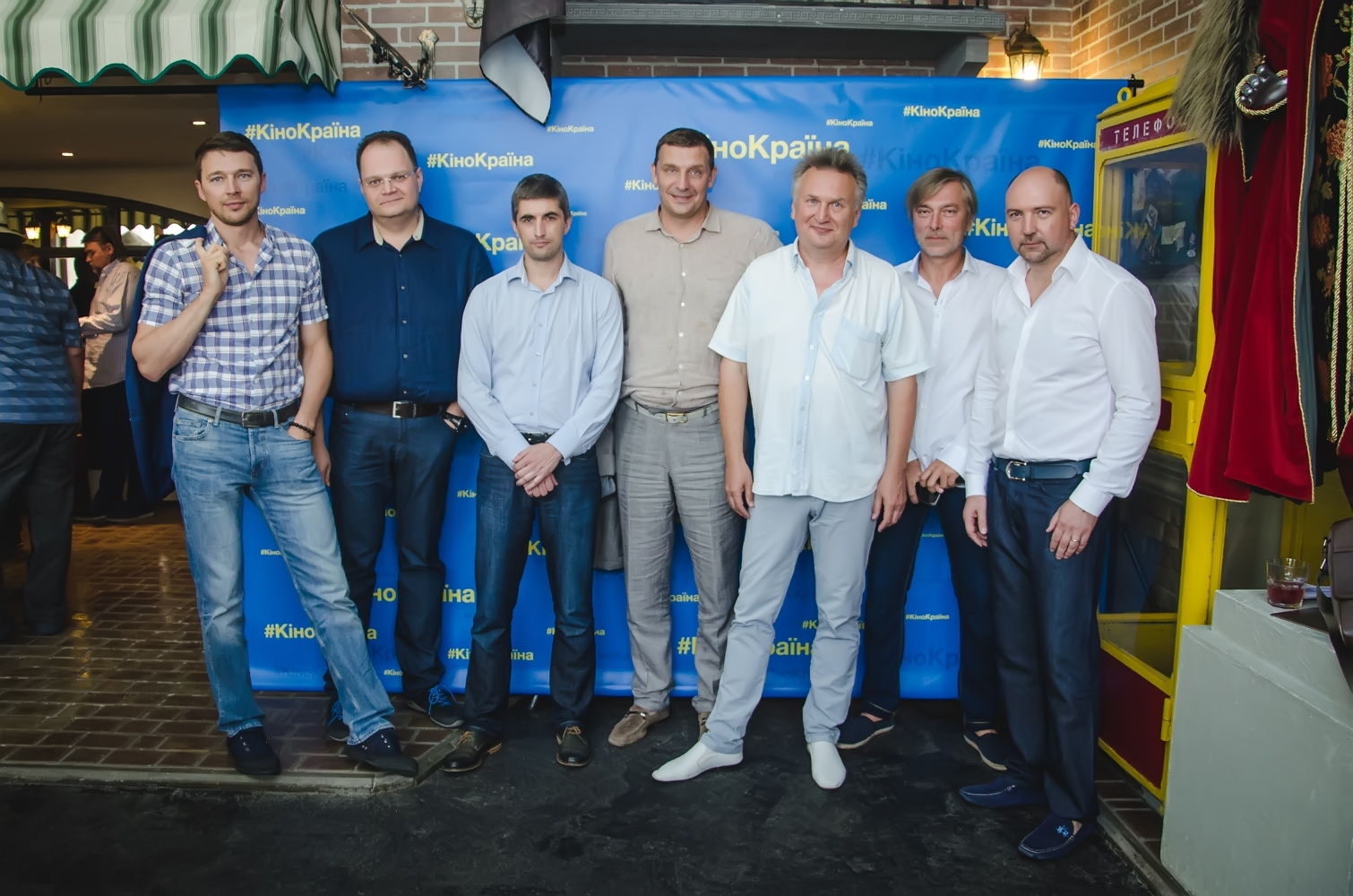
If You Want to Become a Solid Player, Move to the West and to the East
Which product will you take with you?
Our content, our services, our creative products, our capacities – we have things to be proud of. Unfortunately, the crisis of 2008 somewhat slowed this movement down. And the latest events slowed it down, too.
Are they even expecting us?
On the one hand, they are not. They are used to calm life. They are not used to quick decision-making. They are scared – to draw a parallel with Game of Thrones, if you will – of those to the other side of the wall. The wildlings. To some extent we are the wildlings to them. But on the other hand, they are definitely lacking new blood, fresh ideas, creativity and people able to work under extreme conditions.
What Are European Partners Impressed With?
Recently, who have become this “new blood” for Europe and the world in general? Which countries made it?
You know, it may seem paradoxical, but during the last five years four territories “hit it home” in the media, series and film world. First of all it is Scandinavia, which became a trend-setter with its films and series. Their Bron series is fantastic. Second, the political thrillers from Israel. Third, Turkey who sold its series abroad for more than one billion dollars. Fourth, South Korea, which is also a trend-setter. You’d be surprised, but three or four series from your “Filmed in Ukraine” ranking are the adaptations of Korean original scripts. One of the most successful series of the previous year produced by Inter group, Bring My Love Back, is an absolute franchise, an adaptation built on the Korean format. Why am I saying all this: they are not expecting us, on the one hand, but they really want us, on the other.
Do the Europeans signal in some way that they are interested in cooperation?
If three years ago we used to have meetings with cogs in the wheels of media companies, telling us, “Ah, Ukraine? Maybe, of course” – now everything has changed. Now the first persons come to the meetings to discuss serious projects and make the first calculations with us. There is also the surprise and envy in their eyes when they come to us and see that we can do things here and how we do them.
Last year we sold our content to more than 100 territories. These are Philippines, Indonesia, Malaysia, Vietnam, Singapore, Venezuela, Peru, China, USA, Canada, France, Germany, the Czech Republic, Bulgaria, Poland, Africa, Lebanon, and many more. In particular, Battle for Sevastopol was sold to France, Germany, UK, Poland, Japan, Korea, and Turkey. We sold Vanga and History of Criminalistics to Poland; The Great Dreamers cycle of TV programs went to China. The Eskimo Girl cartoon series was sold to the USA, Canada, and to the Arab world territories. Yes, it’s not Star Wars yet in money equivalent. But these are the first big steps.
What are the sums of these big steps?
It’s quite a lot of money. Some five years ago we put a goal before us to have up to 25 to 30 per cent of the turnover from non-CIS territories. We reached 15 per cent, and last year we surpassed the 25 per cent threshold. This is very good.
Slow and steady wins the race, and we are absolutely convinced that big projects will come. We have things to show and things to do both on our own and together with our local and foreign colleagues. Yes, this journey is complicated and in no way simple. But if you’re doing something, is it ever easy?
What are your competitive advantages? What can FILM.UA do that few or no one else can?
We have strong creative products; we can create stories of interest to people. The Sniffer, which has been sold to 56 countries as of now, is not the only one. Two or three more are being discussed.
Kvartal moves in the same direction. Make the Comic Laugh is a TV show sold to many territories.
Our guys doing post-production and making special effects are very popular. For the last four years in a row we are nominated for Academy Awards in the VFX world, which are held by VES (Visual Effects Society). Unfortunately, we haven’t received any awards yet; we’ve been losing to Game of Thrones three years in a row. Still, the works are fantastic.
Foreign partners are impressed with our work capacity, our ability to create content and the relatively low price of our services. A regular European TV series starts at 1 to 1.3 million euros per episode. The Sniffer cost 500 thousand per episode; it is mind-blowing for this market.
Last year we launched our own satellite channel, FILMUADrama; its program consists exclusively of our content.
The broadcasting of the first paid satellite channel from Spravzhni Kanaly LLC, FILMUADrama, started on October 1, 2015 in the Cine+ package from Volia Cable provider. The channel made it to top 15 of Volia Cable film channels. According to January results, it showed the biggest growth for the number of viewers among the top film channels, having increased its share by 70 per cent — Delo.ua.
Are you happy with its start? What kind of tasks do you put before its top management, both the strategic and short-term ones?
I am more than happy with it! It is our story 100 per cent. The content, technical support, channel design and promotion – everything was made in the Group. The tasks are obvious: more subscribers. By the way, our partner Volia Cable took our channel for distribution and will offer it to other providers starting from April.
Don’t Be Scared, Just Risk It
What slows down the development of film business in Ukraine?
There are two things… And I won’t start with the state. It’s a separate story, but I won’t start from it anyway.
The main enemy is the indolence in out-of-the-box decision-making among people on the commercial market. They are used to the following way of things: I feel fine, my salary arrives on the 5th and the 20th days of the month, why should I lift my ass from my warm and comfortable chair. This is what throws all of us back: market players, shareholders, and companies alike.
I have always been more disappointed about the loss of opportunities than about the loss of money. The biggest failure is when you don’t manage to totally convince the management and shareholders that film industry is a business. Sometimes I managed to do that. Once I risked and managed to persuade the shareholders: this is how Svaty appeared, a wonderful TV show franchise, an outstanding phenomenon on this market. But it is hard to break the walls of conventionality telling about the way you could work.
Why do you need this risk of a trailblazer tearing down the walls? What if you are mistaken, and your cautious opponents are right?
It is possible. But the saddest thing for me would be to tell myself, I am such an idiot that I didn’t do that. I’d prefer to make a mistake.
Still, there is an opinion that crisis is no time for experiments; you should keep a low profile and wait out…
You shouldn’t be afraid, you should risk, make decisions and experiment. Now we are working on five to six experiments at the same time.
Are you happy with the results of last year’s experiments?
We had an experiment with screening an Okean Elzy concert in cinemas. It wasn’t that fantastic commercially. Still, it ranked second among Ukrainian films for the previous year. Second! Because all the rest combined haven’t even passed the threshold of one million hryvnyas.
The first was Battle for Sevastopol, and it was a landslide victory. That was also an experiment, and if we hadn’t opted for it, I would have really regretted not trying. Besides, I am convinced that the money you took from the state for production should be paid back. The state is just another investor. When we started sending funds to the State Film Agency from Battle for Sevastopol distribution, their first reaction was, “Are you out of your mind? How much?! And that’s not all?” “No, it’s not”, we’d reply.
Using the money from film distribution, including distribution in Russia, State Film Agency was able to organize the Days of Ukrainian Cinema in London and a stand at Berlin International Film Festival. We pay money back and will continue to do so. That is our committed position.
You Just Have to Change the Magic Mirror in Your Head
If we started talking about the relations between business and state: how much will the new rules of the game envisaged in the new law on state support for film industry really help you? The law draft has finally been adopted by the parliament in the first reading, so we can hope that the novelties introduced there will soon be implemented.
The number one advantage for us is the practice of so-called rebates. State support, subsidies, tax and other preferences are good. But this is only the first step. (Find out about the law draft in more detail — Delo.ua.)
I am deeply convinced that the rebate will take our industry to a new level. Because it’s not just money coming into the country. It’s cinematographic experience and communication. It is some kind of chemistry impossible for any other business. If this law is adopted, three or four implemented international film projects will do more than the Ministry of Information Policy for the whole time of its existence. Because they will show that Ukraine is a) beautiful; b) reliable; c) suitable for European and global projects.
When I read about Game of Thrones and a biopic about Jacques-Yves Cousteau filmed in Croatia, or BBC filming War in Peace in the Baltic countries, I applaud it. I give a round of applause to the Georgians who introduced the rebate starting from January 1; the same goes to the Norwegians and Czechs. They understand that the mix of capitals, minds and talented people makes for fantastic explosion and leads the industry and the country as a whole towards prosperity.
Now we have requests for two big projects: one is about 15 million euros, another one, seven. But before deciding to produce in Ukraine, those big European companies ask us: what’s with the rebate, guys?
So the absolutely necessary condition for this year is a) to break insolence and b) to adopt the law. Even without improvements to the imperfect form it has now. In any case we’ll think about creating a system of rebates on commercial level. We’ll make films, we’ll bring international groups here.
One European group has been brought, and it has Luc Besson’s favorite DOP in it. I am talking about Polina, a full-length feature film in the English language. Please tell us how such projects happen.
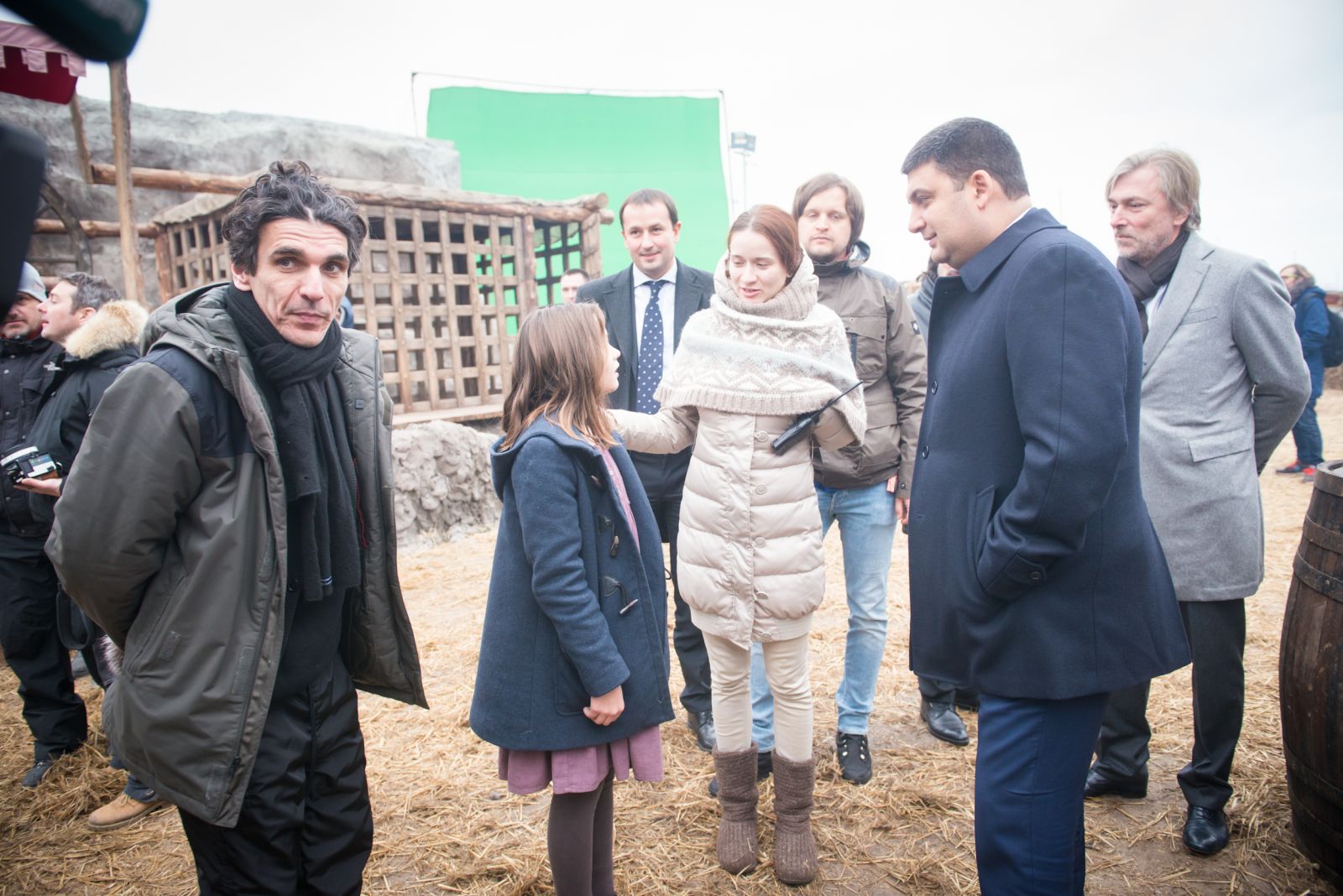
At the film set of Polina, an English-language full-length feature films produced by a Belgian company WILD TRIBE FILMS and FILM.UA .
Polina is a big joint French-Belgian project. In autumn, a Belgian director Olias Barco came here to meet us and discuss possible projects… He was walking around the studio and suddenly saw a girl leaving our acting school for children. He rushed towards her and said: “I’ve been looking for you for three years, I’ll come in a week, we’ll make a film!” I remember I was really skeptical about that, answering something like “You don’t say so.” But he did come in a week and brought Thierry Arbogast with him – he is the favorite DOP of Luc Besson who filmed Leon: The Professional, The Fifth Element, and Lucy.
So the girl (Polina Pechenenko from Kyiv — Delo.ua) starts filming, tanks drive around, cars explode and superstars come – all on the edge of Kyiv. As we see, everything is possible. Even in this depressed city neighborhood. You simply have to change the magic mirror in your head a bit and try to make others see it.
Which achievements bring you the most joy now: the conclusion of such international contracts? Financial successes? Or something else?
I have been asked this question, and I thought about it for a long time. Then I saw from the window of my office how children from our acting school returned from lunch to the pavilion to make their own film. This is fantastic. And the other story was in December. We opened a café in the studio. You’ll tell me, here is a psycho when you see one… Why do it in this depressed neighborhood? But once I go in and see Ada Rogovtseva sitting there and drinking coffee. And I remembered myself as a 10-year-old boy who used to watch all those bombastic sagas with her. And now she is in my café on the edge of Kyiv, just sitting there and drinking coffee. Actually, there isn’t a bigger delight in life.
The Most Interesting Thing Is to Build the System
What is the most interesting thing for you right now?
Building the system. You won’t find scripts on my desk. Scripts are to be read by people who understand this craft.
Don’t you wish to produce some project personally?
Possibly one day, when the whole system works perfectly. My daughter asks me, “Dad, what do you do? You are constantly talking…” I try to explain it to her, “You know, Nastya, there is a thing called an extension cord and an adapter. Your dad works as an extension cord and an adapter: where a bit is lacking, I extend the length; where the contacts don’t match, I try to marry the plug and the socket.”
And if the voltage exceeds the necessary value, you work as a stabilizer…
At times I am a stabilizer as well… I try to find the biggest amount of human, technical, technological and financial resources to ensure the work of the whole mechanism. My daughter says, “No, dad, your work is not really interesting. Cinema is much better, it’s hustling and bustling, special effects. Why don’t you work as an actor?” And I answer, “Sweetie, I suck at it…”
By the way, starting from this year we want to introduce a rule for the studio employees, top management included, to film in small episodes.
What for?
You can read about films and watch films as much as you want, but it is essential to go through this process. It is important to feel a bit cold and hot, to feel the burden of profession on your shoulders. Then the accountants and lawyers will treat the budgets, actors and work conditions somewhat differently.
We often have businessmen visiting – they are investors and partners we implement projects with. Serious investment bankers and financial directors would come and say: okay, guys, don’t tell us about the cinema, we are not interested in that, get us the numbers, papers and forecasts… I would answer, “Everything will be ready in 15 minutes; for the time being, I offer a small tour over the film studio.” In 15 minutes, they would arrive in a totally different mood: oh, can we film here or there? This is another world. This is the magic dust bringing wooden soldiers to life.
What Makes Happy
Which company achievement of the previous year are you the most proud of?
My main joy is about the sales of our content to more than 100 territories over the whole world. Another number – last year one of our companies dubbed over 100 projects, it is about 25 per cent more than before.
POSTMODERN dubbed many hit premieres for the cinema: Battle for Sevastopol, The Bridge of Spies, Black Mass, Hitman: Agent 47, The Man from U.N.C.L.E., Mad Max: Fury Road, and many others. Tak Treba production studio, for example, dubs all seasons of South Park animation series into Ukrainian, commissioned by Ukraina TV channel, and also dubs True Detective for NTN.
I am happy that we managed (even though we are at the very start of the process) to launch animation on an industrial scale.
We have cinema releases planned until 2021. What is Disney famous for? They know for sure what will be released in 2017, 2018, 2019, 2020, 2021, 2022 and 2023. We also know more or less what will be happening with our animation.
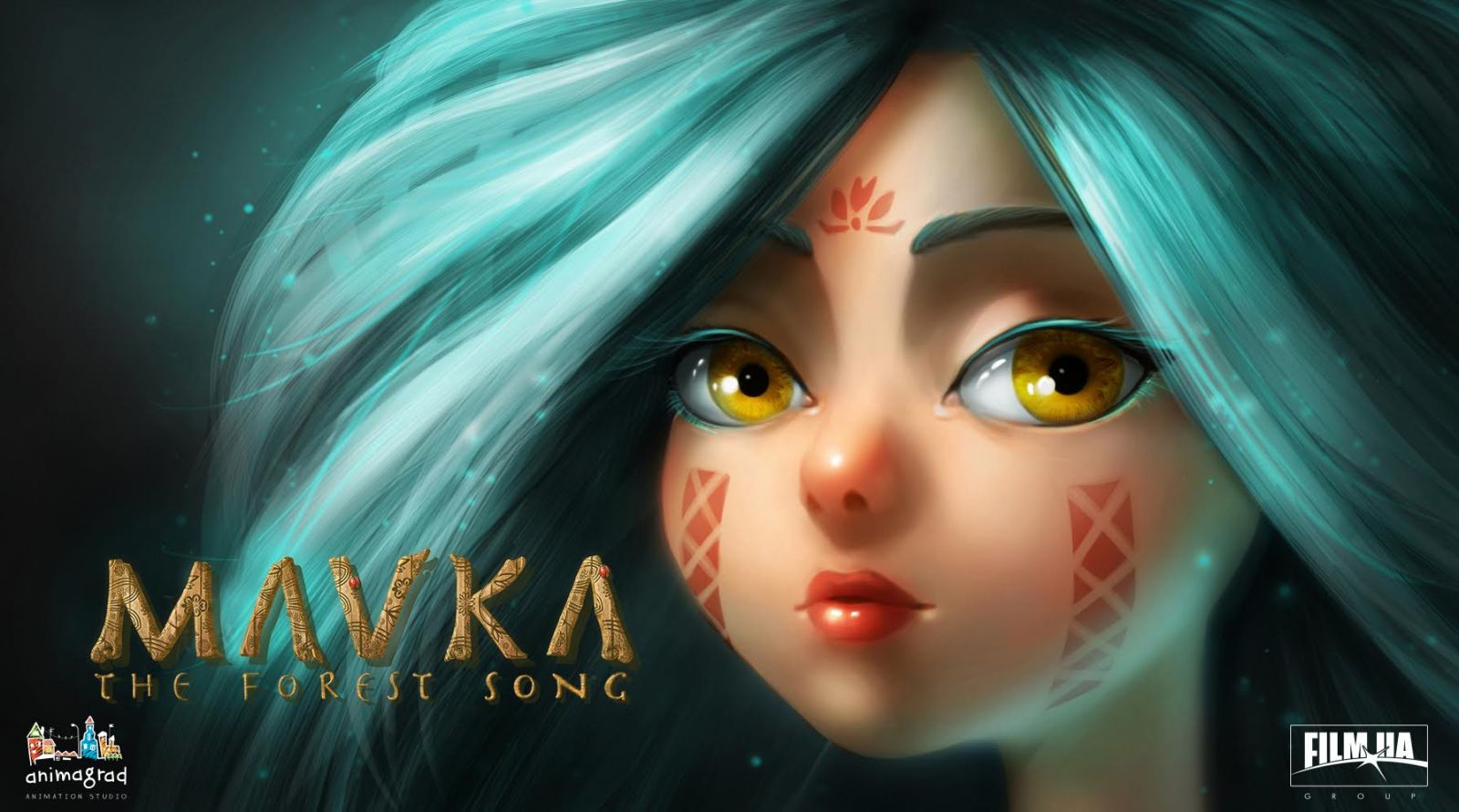
The program for development of FILM.UA Group animation business for the following five years includes a package of full-length animation films and development of animation series. Animagrad studio already started the program’s implementation. It has three full-length projects in production: The Stolen Princess (release planned for 2016-2017), Mavka. The Forest Song (release planned for 2017-2018), and The Snow Republic (an original development of Animagrad studio, release planned for 2018-2019).
The year before last you made one feature film for the big screen, Single by Contract, last year there were two, Battle for Sevastopol and OE20. Live in Kyiv. Are you going to have three this year? There is Polina, what are the other two?
Yes, this year there are already three projects aimed at cinema distribution. Polina, a documentary Okean Elzy. Backstage (a working title), and a fantasy film The Stronghold.
I am happy that in spite of the challenging year we did not decrease but instead increased the amount of produced series of rather solid quality. (In 2015, FILM.UA Group produced 23 projects, 376 hours of commercial content in total. — Delo.ua). And we are very happy that the TV channel was launched.
About Those on the Light and the Dark Sides
What are your relations with media groups?
With some we partner more than with the others, but we work with all four media groups. They don’t like us very much; they say we are harsh. We are not harsh, but we might see a bit farther ahead.
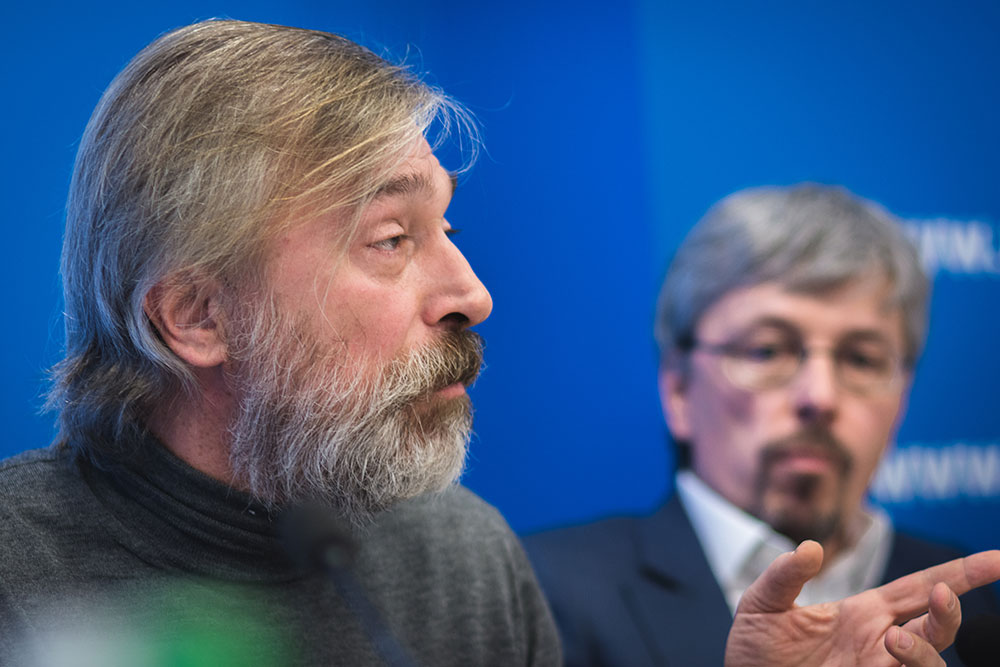
At the roundtable discussion “The Future of Russian Product at the Ukrainian TV Market”
So where are you harsh?
In negotiations and convictions. This is what I told you about before. Yes, sometimes we are mistaken, but I am for experiments.
Who is the closest to you in spirit? Who, just like you, is ready to risk and experiment?
StarLightMedia, for sure. Borodyansky is magnificent. We speak the same language with the people from his key team.
If we draw a parallel with your favorite Star Wars?..
If we draw a parallel with Star Wars, Borodyansky is definitely on the Light Side. But it doesn’t mean that people on the Dark Side do not have unique abilities deserving respect. Let us say, very approximately…
Everyone will recognize themselves anyway…
The main opponent, Borodyansky’s “father” – I mean the father in film and television sense – is definitely on the “Dark Side”. Even though he has fantastic capacities and abilities. The son of Khan Solo and Leya became a villain and went to the Dark Side. Darth Vader used to be Anakin Skywalker a long time ago. This is how it happens in life. This is why Star Wars wins. This is life, though a bit exaggerated.
Ukraina and its management is more about the “Light Side”. Oh my God, the Jedi will kill me…
Great… What about Inter?
For me, Inter is a galaxy far far away. But in spite of the side, dark or light, we are all in it together. And when the moment comes, we can and must unite to achieve the final result advantageous for everyone.
FILM.UA Group
Starting from 2002, FILM.UA Group has produced 5,682 episodes and 4,545 hours of commercial content, out of those 3,329 episodes and 2,996 hours of unique content for TV, 60 series projects, 5 animation projects in 2D and 3D, 80 television films, 14 television programs, three full-length distribution films, one cinematic, and 597 episodes of content for the new media.
1,042 deals have been concluded for the sales of content to 100 territories over the whole world. Only The Sniffer series was bought by 56 foreign distributors. TF1 (France) and NHK, a big Japanese TV channel, acquired the format to be adapted for their own TV market.
The company films were nominated 116 times and received 57 awards.
In particular, Battle for Sevastopol, the visual effects for which were produced by POSTMODERN Digital studio (a part of FILM.UA Group), made it to the short list of the most sought-after award in VFХ and CGI, VES Awards. The film was competing in the nomination Outstanding Visual Effects in a Photoreal Episode. For the first time, POSTMODERN studio was nominated for VES in 2012 (for The Ballad of a Bomber) and became the first CIS company, which made it to the VES Awards short list.
In 2013, Butterflies made it to two VES nominations at once, Outstanding Visual Effects in a Broadcast Program and Outstanding Created Environment in a Commercial or Broadcast Program.
In 2014, live action trailer War Thunder: Victory Is Ours was nominated for Outstanding Created Environment in a Commercial, Broadcast Program or Video Game; it was created by POSTMODERN company for Gaijin Entertainment.
Prepared by Yelena Gladskikh
FILM.UA Group
22, Mykoly Zakrevskoho str., Kyiv, 02232, Ukraine
tеl.: 0 800 308 028, +380 44 501-39-71 fax: +380 44 546-68-97 e-mail: info@film.ua
Developed by Argentum IT Lab
